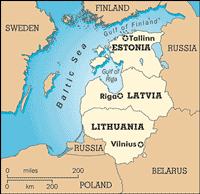Russia reacts coolly to "political games" of the U.S. Senators and the Baltic presidents
The U.S. Senate resolved to urge the Russian government to admit and condemn “the illegal occupation and annexation” of Estonia, Latvia, and Lithuania. The resolution was approved unanimously on May 19.

 The resolution was introduced by Rep. Gordon Smith, Dem. Dianne Feinstein and Dem. Richard Durbin. The concurrent resolution, introduced by Rep. John Shimkus and Dem. Dennis Kucinich, is yet to be passed by the U.S. House of Representatives. Both congressmen are the co-chairmen of the House's Baltic Caucus, a pro-Baltic interest group. The resolution reportedly enjoys a special favor of Rep. Christopher Cox, the Chairman of the House's Committee on Homeland Security.
The resolution was introduced by Rep. Gordon Smith, Dem. Dianne Feinstein and Dem. Richard Durbin. The concurrent resolution, introduced by Rep. John Shimkus and Dem. Dennis Kucinich, is yet to be passed by the U.S. House of Representatives. Both congressmen are the co-chairmen of the House's Baltic Caucus, a pro-Baltic interest group. The resolution reportedly enjoys a special favor of Rep. Christopher Cox, the Chairman of the House's Committee on Homeland Security.
The document suggests that “the Government of the Russian Federation should issue a clear and unambiguous statement of admission and condemnation of the illegal occupation and annexation by the Soviet Union from 1940 to 1991 of the Baltic countries of Estonia, Latvia, and Lithuania” and asserts that this supposed “occupation brought countless suffering to the Baltic peoples through terror, killings, and deportations to Siberian concentration camps”. According to the American senators, such statement on the part of Russian Federation is supposed to bring “enhanced regional stability”.
Simultaneously the U.S. Senate passed the resolution, expressing “continued support” for the construction of the “Victims of Communism” Memorial, aimed to perpetuate the notorious Cold War propaganda conception (originated from the ideas formulated by the prominent German Nazi ideologist Alfred Rosenberg) of “Captive Nations” - from the Baltics to Vietnam - oppressed by the “ruthless Communist tyranny”.
The reaction on the part of Russia was rather cool. "An intricate political game is being played because in recent years Russia started to realize more clearly and, most importantly, defend its interests in the world," chairman of the State Duma committee on foreign affairs Konstantin Kosachev said, cited by RIA Novosti. "Many centers of power and countries would like to see [the return] of 1990s Russia when the country was weak, quiet and did not demand anything."
Kosachev called the resolution a "political declaration" that could be considered a recommendation rather than a directive for the White House. "I have no doubt that Russia will not give in to the resolutions demands. It will certainly not have any legal consequences for the status of Russian-U.S. relations," he said.
According to Russian Foreign Ministry spokesman Alexander Yakovenko, Russia "does not see any reason to make special comments on the resolution adopted by the U.S. Senate."
 The president Putin in his turn replied sardonically to the question if Russia was ready to cede a part of her territory claimed by Estonia and Latvia. “They will receive a dead donkey's ears rather than Pytalovo district,” said Mr. Putin in an interview given to Komsomolskaya Pravda daily (Pytalovo district is situated in Pskov region in the North-West of Russia).
The president Putin in his turn replied sardonically to the question if Russia was ready to cede a part of her territory claimed by Estonia and Latvia. “They will receive a dead donkey's ears rather than Pytalovo district,” said Mr. Putin in an interview given to Komsomolskaya Pravda daily (Pytalovo district is situated in Pskov region in the North-West of Russia).
The Russian-Latvian border treaty had been already prepared for signing. However, Latvia has advanced a series of political demands, reports RIA Novosti.
At the same time, the Russian foreign minister Lavrov quoted Latvian President Vaira Vike-Freiberga as saying during a conversation on the sidelines of the Council of Europe summit in Warsaw that it was necessary to change the incorrect position being taken by the Latvian government. "Latvia has adopted a unilateral declaration that actually confirms its territorial claims to Russia," recalled Lavrov. "This is absolutely unacceptable to us," he added.
Subscribe to Pravda.Ru Telegram channel, Facebook, RSS!


